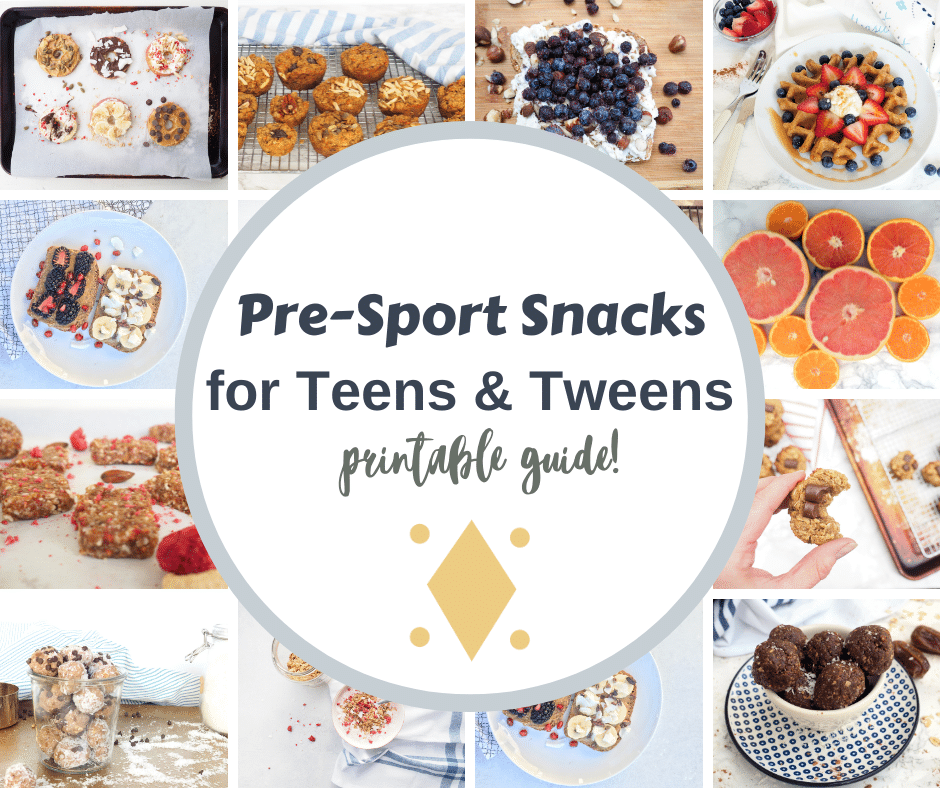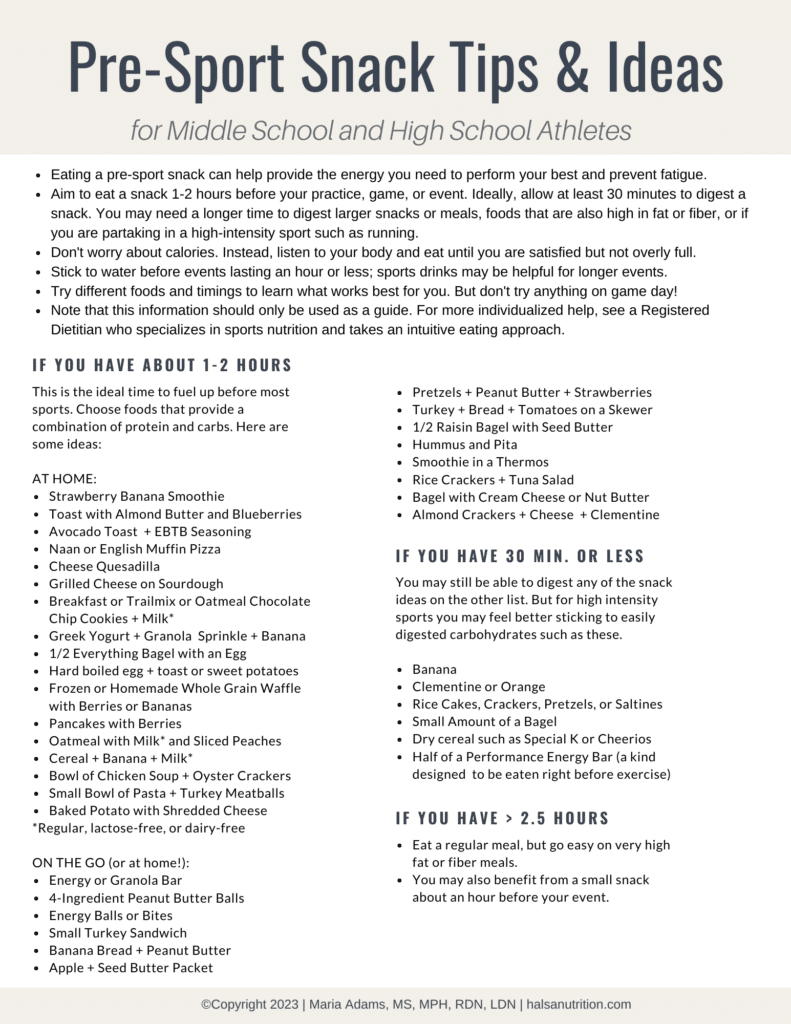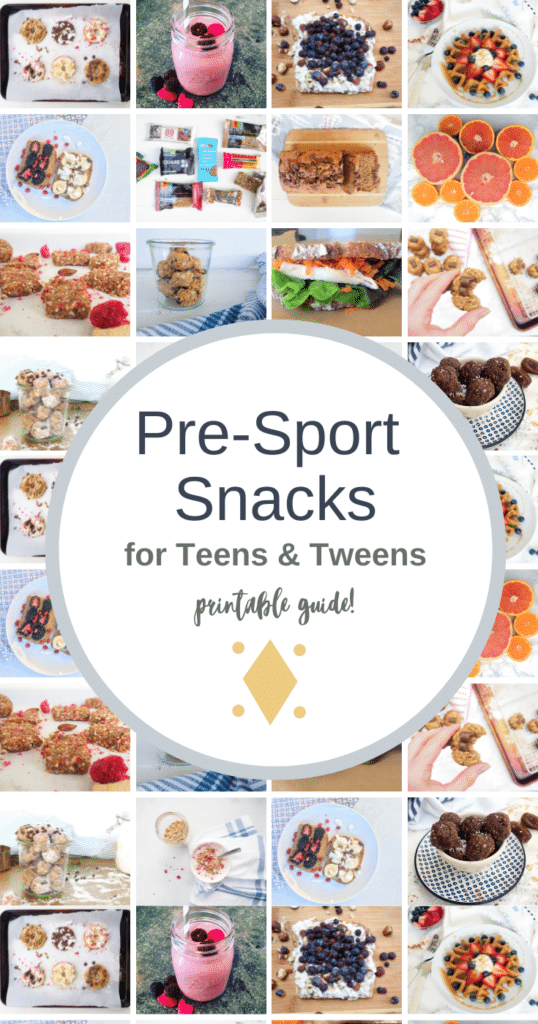
Pre-Sport Snacks for Tweens and Teens
Help your active tweens and teens fuel up before their next practice, game, or event with these tips and pre-sport snacks.
Keeping growing tweens and teens fueled is no joke. Add sports to the mix and the “preferred” snacks disappear even sooner!
Growing, active kids need an abundance of fuel in the form of meals, snacks, and more snacks. And while snack time may be part of the daily routine when our kids are younger, as they get older and more independent, we may leave it up to them to figure out.
But eating a nourishing after-school snack is just as important for older kids. And, in fact, what they choose is especially important if they are trying to maximize their energy on the field or court. When, what, and how much they should eat are all good questions, and the answers will vary depending on the timing of the snack (or other meals), the intensity of the sport, and your child’s digestive system.
This post is meant to serve as a guide for you and your child. Go ahead and share it with your tween or teen athlete, and be sure to print out the handout as well.
Pre-Sport Snacks for Tweens and Teens
Timing of the Snack
In general, plan to eat a snack 1-2 hours before partaking in a sport. Allow 3-4 hours to digest a full meal, such as breakfast or lunch. If you only have 30 minutes or less, eat a very light snack if you know that you can digest this without discomfort during your sport. If you partake in high-intensity sports, you will probably want to avoid eating right beforehand.
What to Eat
1-2 Hours Before Sport: Carbs + Protein
When seeking out snacks to eat 1-2 hours before a sport, look for options that will provide a combination of protein and carbohydrates. A little fat and fiber are fine too, but this is probably not the time for french fries or bean-packed chili. Here are some ideas:
AT HOME:
- Strawberry Banana Smoothie
- Toast with Almond Butter and Blueberries
- Naan Pizza
- Cheese Quesadilla
- Grilled Cheese on Sourdough Bread
- Breakfast, Trail mix, or Oatmeal Chocolate Chip Cookies + Milk
- Greek Yogurt + Handful of Granola + 1/2 Banana
- Wild Blueberry and Cream Toast
- 1/2 Everything Bagel with an Egg
- Frozen or Homemade Whole Grain Waffle with Berries or Bananas
- Whole Grain Pancakes or Cardamom Banana Pancakes (gf) with Berries
- Bowl of Chicken Soup + Oyster Crackers
- Small Bowl of Pasta + Turkey Meatballs
- Baked Potato with Shredded Cheese
ON THE GO (or at home!):
- Energy or Granola Bar – read this post to learn how to choose one.
- 4-Ingredient Peanut Butter Balls
- Energy Balls or Bites: Cocoa Coconut Bliss Balls, Raspberry Almond Power Bites, Cookie Dough Nut Pulp Bites
- Small Turkey Sandwich
- Banana Bread + Peanut Butter
- Mini Pumpkin Muffins + Pumpkin Seeds
- Apple + Seed Butter Packet
- Cheese + Crackers + Grapes
- Pretzels + Peanut Butter + Strawberries
- Turkey + Bread + Cherry Tomatoes on a Skewer
- 1/2 Raisin Bagel with Seed Butter
- Hummus and Pita
- Smoothie in a Thermos
Both this list of Snack Ideas for Tweens and Teens and this list of 20 Snack Ideas have plenty of additional great options.
30 Minutes Before Sport: Carbs
If you need a snack right before your practice or event, choose easily digested carbohydrates such as an orange, a banana, pretzels, or plain toast.
All Day: Drink Water!
Pair your pre-sport snacks with water. In general, young athletes don’t need sports drinks, which can provide high amounts of sugar, artificial additives, and even caffeine. Water is your best bet. If you don’t love the taste of water, try adding berries or lemon slices. Note that there are times when a sports drink may be beneficial, such as for a high-intensity sport lasting longer than an hour or when it’s really hot and humid out. Sports drinks may also be helpful if you have a sensitive GI system and have a hard time eating anything before a competition, but consider talking to a Registered Dietitian first.
How Much to Eat
You will see various guidelines for how many calories to eat before different sports. My recommendation is to skip the calorie counting and instead listen to your body! Everyone is different, and just like with the timing of the meals and what to eat, you know yourself best. Aim to eat until you are satisfied and comfortably full. Learning to trust and listen to your body, not a calorie guideline, is part of Intuitive Eating.
Trouble Shooting
If you end up with cramps or digestive distress during your sport, take a look at what, when, and how much you eat. Maybe you eat too soon or too much before hitting the trails, the track, the field, or the court. Or maybe the type of food you ate wasn’t as easily digested as you had hoped. Try switching from regular milk to lactose-free or plant milk, which can be easier to digest for many people. If you are partaking in a high-intensity sport such as running, lacrosse, or gymnastics, you may also fare better with pre-sport snacks that are lower in fiber, for example, white bread instead of whole grain. (Save the whole grains and fiber for earlier in the day or after your sport). Whatever changes you make, be sure to try them out on practice days, rather than experimenting with new foods or eating strategies on the day of a game or competition.
If you find yourself bonking or low on energy while exercising, it may be because you didn’t eat enough beforehand. Note that in addition to your snack, the other food that you ate that day and even the day before will also affect your energy levels! However, if you are eating adequate amounts of food and getting enough sleep but still feeling consistently low energy during sports, consider making an appointment with your doctor. A common cause of fatigue and low performance among female athletes is iron-deficiency anemia. Read more about the importance of iron here.
Hydration can also play a huge role in energy status. So remember to drink water throughout the day before your event as well as during events when possible.
Free Printable:

Additional Posts You May Like:
- How Much Protein Do Teens Need?
- Post-workout Snacks for Teens and Tweens
- Nutrition for High School and College Athletes
- Intuitive Eating for Teens
Resources for More Information:
- Fueling Young Athletes by Heather Manigieri, RDN, CSSD
- Eat Like a Champion: Performance Nutrition for Your Young Athlete by Jill Castle, MS, RDN, CDN
- Feeding Your Child Athlete
Disclaimer:
Note that this post is intended as a guide only. For more individualized guidance, please consult a Registered Dietitian.

Leave a Reply